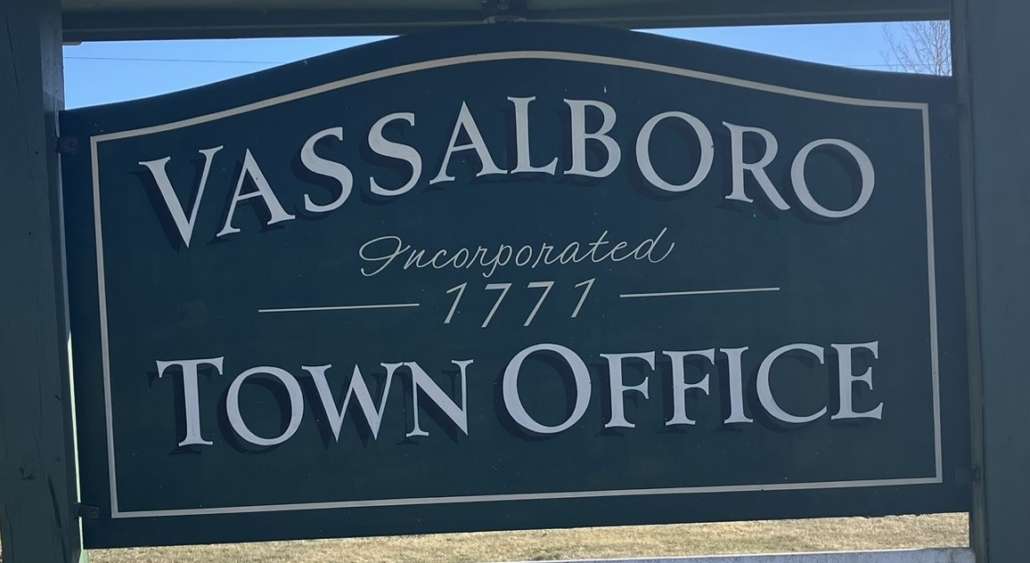China select board members, joined by some budget committee members and several town employees, held a long four-part meeting Monday evening, Feb. 24.
They started at the public works garage on Alder Park Road, where Director of Public Works Shawn Reed introduced them to the large trucks, all wearing their plow gear this time of year, that live there.
Reed explained each vehicle’s advantages and disadvantages as he requested a replacement truck in the 2025-26 fiscal year.
The group then viewed a smaller truck in the old town garage in the town office complex before adjourning to the town office meeting room for the bulk of the select board meeting.
Reversing a split decision Feb. 10 (see the Feb. 13 issue of The Town Line, p. 3), select board members voted 4-1, with Blane Casey still opposed, to recommend buying a new plow truck next year, at a cost expected to be slightly under $300,000. Town Manager Rebecca Hapgood said about that amount is now in the truck reserve fund.
Reed recommends selling one of the old trucks after the new one arrives.
Select board members’ longest discussion was with Robert O’Connor and Jamie Pitney, of the China Broadband Committee, over the proposed agreement with Unitel for expanded broadband service in China (another topic discussed at the Feb. 10 meeting).
Unitel proposes a new main line running from its Albion office through China to Palermo, to connect with the five-town Waldo Broadband Corporation. A second phase of the project would expand service to parts of China currently underserved or unserved.
Board Chairman Wayne Chadwick repeated his refusal to approve a project that involves China investing money — $370,000 in TIF (Tax Increment Financing) funds – without a firm guarantee that un- and underserved China residents will be served within a reasonable time.
Pitney and O’Connor provided as much information as they could. Because some of the project funding depends on a federal grant, they, too, expressed uncertainty, about whether the grant program would exist and whether Unitel would be awarded one.
The grant is called BEAD, which stands for Broadband Equity, Access, and Deployment Program. Select board members voted unanimously to sign a letter supporting Unitel’s grant application. They took no action on the draft agreement with Unitel.
In a series of unanimous votes, select board members:
— Approved rules, procedures and membership fees for the planned community garden on the Lakeview Drive lot south of the town office. The document is on the town website, chinamaine.org, under two headings: Officials, Boards, & Committees, subheading China for a Lifetime Committee; and Community, at the bottom of the list.
— Authorized the Community Forest Committee to apply for a grant from the Portland-based Libra Foundation, for $4,093, for locally made trail signs for the forest behind the China schools.
— Revised the town’s building permit fee schedule, reducing one fee and increasing two others to better reflect the codes officer’s time.
— Appointed Jane Robertson budget committee secretary.
The third part of the select board meeting was a preliminary review of part of Hapgood’s draft 2025-26 municipal budget. The manager briefly summarized proposed changes in the first five (of 12) accounts.
Highlights:
— Board members agreed unanimously the administration account will not include a suggested $11,000 to create the position of part-time recreation director. Hapgood said $10,500 was approved in the 2023-24 budget, but the town was unable to hire anyone for the position.
— By another unanimous vote, board members agreed the boards and committee budget will not include stipends for themselves.
— They deleted from the public safety account a proposed increase in the hours Kennebec County sheriff’s deputies serve the town, from eight to 10 a week. Chadwick commended the officers for their work, but considered coverage adequate.
— In the proposed solid waste budget, Hapgood said hauling costs have been reduced, because “The fabulous transfer station people make sure the loads going out are full” and therefore less numerous.
Board members favor starting a reserve fund to replace the transfer station scales, though they did not decide on an initial amount.
Preliminary consideration of the rest of the budget was postponed at 8:10 p.m., 10 minutes past Chadwick’s unofficial deadline. Board members considered holding a budget workshop later in the week, but were unable to find an evening everyone would be available. Extra budget meetings in March are likely.
The evening’s fourth and final meeting was a separate one, as select board members reconvened as the board of assessors. They unanimously accepted two recommendations from the town assessor on abatement requests, denying one and approving the other.
The next regular China select board meeting is scheduled for Monday evening, March 10.



 People in Maine’s 16 counties are rallying to find common ground and push back on the actions of the Trump administration and Elon Musk’s DOGE, Saturday, March 1, 2:30 – 4 p.m., starting with a march from the Margaret Chase Smith Memorial Bridge, in Skowhegan, and ending at the Miller’s table parking lot.
People in Maine’s 16 counties are rallying to find common ground and push back on the actions of the Trump administration and Elon Musk’s DOGE, Saturday, March 1, 2:30 – 4 p.m., starting with a march from the Margaret Chase Smith Memorial Bridge, in Skowhegan, and ending at the Miller’s table parking lot. To the editor:
To the editor: To the editor:
To the editor: by Sheldon Goodine
by Sheldon Goodine by Hanna Skandera
by Hanna Skandera


